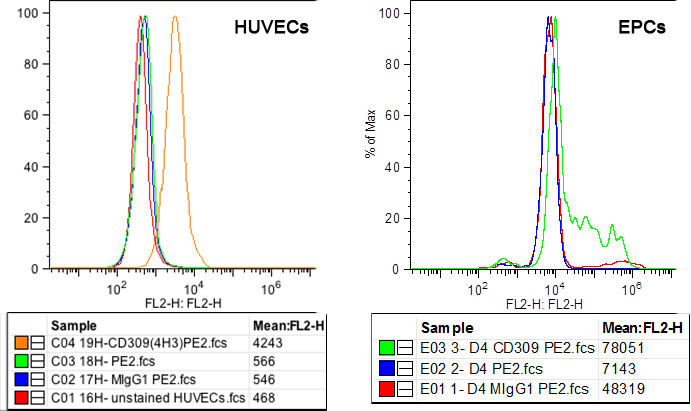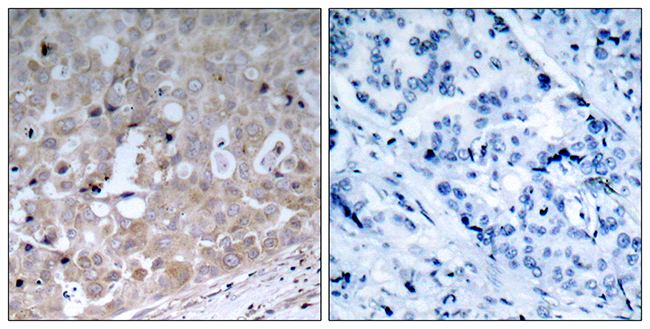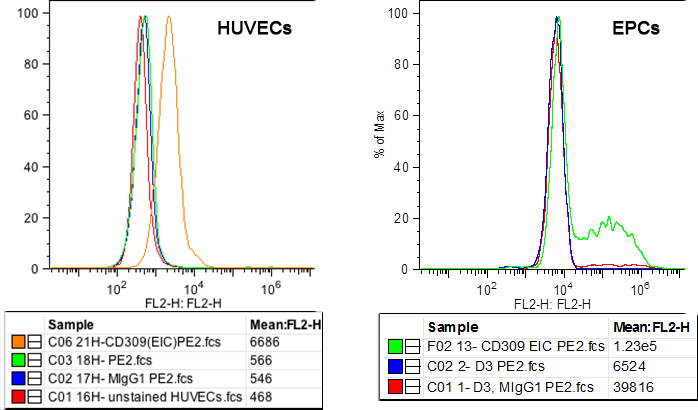
anti-VEGFR-2/KDR (human), mAb (3(4H3))
AG-20T-0109
ApplicationsFlow Cytometry, Western Blot
Product group Antibodies
ReactivityHuman
TargetKDR
Overview
- SupplierAdipoGen Life Sciences
- Product Nameanti-VEGFR-2/KDR (human), mAb (3(4H3))
- Delivery Days Customer10
- ApplicationsFlow Cytometry, Western Blot
- CertificationResearch Use Only
- ClonalityMonoclonal
- Clone ID3(4H3)
- Gene ID3791
- Target nameKDR
- Target descriptionkinase insert domain receptor
- Target synonymsCD309, FLK1, VEGFR, VEGFR2, vascular endothelial growth factor receptor 2, fetal liver kinase-1, kinase insert domain receptor (a type III receptor tyrosine kinase), protein-tyrosine kinase receptor Flk-1, soluble VEGFR2, tyrosine kinase growth factor receptor
- HostMouse
- IsotypeIgG1
- Protein IDP35968
- Protein NameVascular endothelial growth factor receptor 2
- Scientific DescriptionDisruption of the precise balance of positive and negative molecular regulators of blood and lymphatic vessel growth can lead to myriad diseases. Although dozens of natural inhibitors of hemangiogenesis have been identified, an endogenous selective inhibitor of lymphatic vessel growth has not been previously described. A splice variant of the gene encoding vascular endothelial growth factor receptor-2 (VEGFR-2) that encodes a secreted form of the protein, designated endogenous soluble VEGFR-2 (esVEGFR-2/KDR) has been described. The endogenous soluble esKDR inhibits developmental and reparative lymphangiogenesis by blocking VEGF-C function. Tissue-specific loss of esKDR in mice induced, at birth, spontaneous lymphatic invasion of the normally alymphatic cornea and hyperplasia of skin lymphatics without affecting blood vasculature. Administration of esKDR inhibited lymphangiogenesis but not hemangiogenesis induced by corneal suture injury or transplantation, enhanced corneal allograft survival and suppressed lymphangioma cellular proliferation. Naturally occurring esKDR thus acts as a molecular uncoupler of blood and lymphatic vessels; modulation of esKDR might have therapeutic effects in treating lymphatic vascular malformations, transplantation rejection and, potentially, tumor lymphangiogenesis and lymphedema. - Monoclonal Antibody. The antibody will detect native human VEGFR-2/KDR in ELISA experiments and on the surface of different human cell types. Isotype: Mouse IgG1. Clone: 3(4H3). Applications: FACS, WB. Lyophilized. Disruption of the precise balance of positive and negative molecular regulators of blood and lymphatic vessel growth can lead to myriad diseases. Although dozens of natural inhibitors of hemangiogenesis have been identified, an endogenous selective inhibitor of lymphatic vessel growth has not been previously described. A splice variant of the gene encoding vascular endothelial growth factor receptor-2 (VEGFR-2) that encodes a secreted form of the protein, designated endogenous soluble VEGFR-2 (esVEGFR-2/KDR) has been described. The endogenous soluble esKDR inhibits developmental and reparative lymphangiogenesis by blocking VEGF-C function. Tissue-specific loss of esKDR in mice induced, at birth, spontaneous lymphatic invasion of the normally alymphatic cornea and hyperplasia of skin lymphatics without affecting blood vasculature. Administration of esKDR inhibited lymphangiogenesis but not hemangiogenesis induced by corneal suture injury or transplantation, enhanced corneal allograft survival and suppressed lymphangioma cellular proliferation. Naturally occurring esKDR thus acts as a molecular uncoupler of blood and lymphatic vessels; modulation of esKDR might have therapeutic effects in treating lymphatic vascular malformations, transplantation rejection and, potentially, tumor lymphangiogenesis and lymphedema.
- ReactivityHuman
- Storage Instruction-20°C,2°C to 8°C
- UNSPSC12352203






